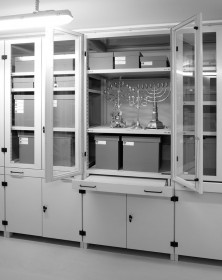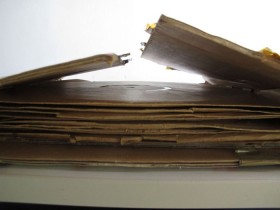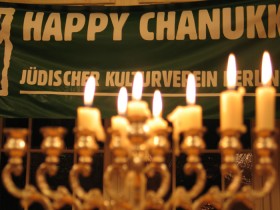
View of Jewish Musem-Berlin storage,© Jewish Museum Berlin, photo: Jens Ziehe
It’s cold. The neon light casts a harsh glare. A gray cabinet stands next to another along white walls. The room feels sterile. The air conditioning hums. A gloomy place.
I put on blue, latex gloves, open one of the cabinets and take out a gray carton. Contours of an item shimmer from under layers of tissue paper. Carefully, I take the object out of the carton and free it from the paper; a microcosm of history presents itself, as if this gloomy place accentuates the aura of the item, the room itself taking a whole step back. → continue reading
There are films slumbering in an archive somewhere, waiting to be discovered. And there are films that have sunk into oblivion but then suddenly pop up again, in the form of a soundtrack.

The schellac records, as found © Jewish Museum Berlin, Photo: Regina Wellen
Recently, when stock was being moved to another depot, our colleague Regina Wellen looked over the collection of 78rpm schellac records with a view to devising a new way of storing them. She thereby came across eleven not yet inventoried records, much larger than the usual sort and with a label suggestive of some other purpose than easy listening on the home gramophone. Luckily for us, Regina was quickly able to establish that these were examples of the sound-on-disc recordings played in cinemas as an accompaniment to screenings of otherwise silent films—synchronously, thanks to the built-in start signal. One of the twenty numbered boxes on each label used to be checked after each screening, so as to ensure that a worn-out record would be replaced in good time. After Regina had dry-cleaned the records and prepared → continue reading

Hanukkah Candleholder at the 15th Hanukkah Ball of the Jewish Cultural Center, Berlin 12.12.2004 © Photo: Igor Chalmiev, gift of the Jewish Cultural Center to the Jewish Museum Berlin
25 years ago today, on 22 January, 1990, the Jewish Cultural Center was founded. One month earlier, on 13 December, 1989, the press agency ADN published an appeal in numerous East German newspapers. It announced a new coalition of Jews living in East Germany who were committed to spreading the knowledge of Jewish culture and history. The appeal was not an accident:
As early as 1986, secular Jews had found themselves gathering, at the invitation of the Jewish Congregation of (East) Berlin, to explore their Jewish roots – a heritage that no longer played any role in their parents’ identities. A group called “We for us – Jews for Jews” formed out of this second generation of political emigrants who had returned to Germany and grown up in the East. During their regular meetings → continue reading


